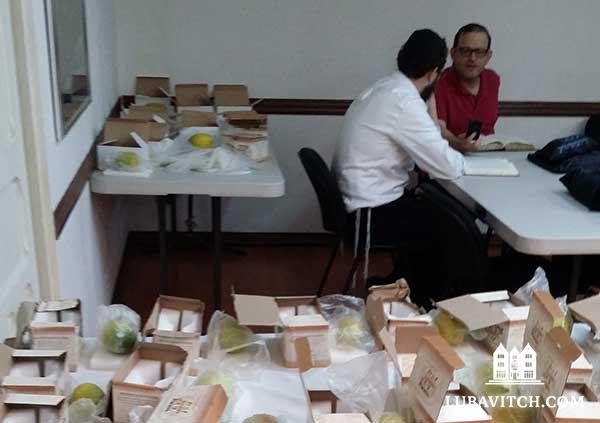Sukkot begins this Wednesday night, and in the days prior, Chabad-Lubavitch centers are encouraging community members to obtain their own set of the lulav and etrog. Known as “four kinds,” the set includes a citrus fruit, palm frond, myrtle and willow twigs.
“It is important for people to have their own set in their homes to feel that this is their holiday,” says Rabbi Herschel Spalter, Chabad representative to Costa Rica. Spalter lays out hundreds of sets in the Chabad House for community members to come and choose from.
Before Chabad was established in the country, in 1989, there were two lulav and etrog sets in one of the local synagogues. While community members who would pray in the synagogue would be given a chance to make the blessing, those who did not make it and their families, seldom had any knowledge about the special holiday observance.
In New York, Efrayim Keller, paces back and forth in the ground floor of an unused store front, taking calls from Chabad rabbis across North America. “There are always late orders and community members who approached their Chabad rabbi in the last minute,” he says.
Keller is grateful for the opportunity to assist those who do not live near central Jewish communities, where the lulav and etrog are readily available before Sukkot. “We make a great effort to keep the cost down for these communities and even when there is a shortage, we are for the most part successful.” This night they were packing for communities in Mequon, Wisconsin; Richmond, Virginia; Fresno, California; Andover, Massachusetts; Las Vegas, Nevada; and Ormond Beach, Florida.
The sets are carefully packaged. Damage to the branches could render the sets not usable for the mitzvah, and blemishes to the citrus could make them look undesirable. “We take great care that the sets should arrive at the Chabad Houses in good condition.”
Spalter in Costa Rica says that they are successful in their mission.
Your Personal Judaism
“Growing up in S. José, I went to the Jewish day school and never heard much about the lulav and etrog. When I began to go to Chabad, I finally learned about this mitzvah,” says Guibor Rosenstock.
He says that this was among the many Jewish observances new to the country. “The rabbi brought to kosher, Chanukah, good Jewish education and so much more to Costa Rica. He taught the entire community how to live a Jewish lifestyle.”
Bringing the observance to the whole family, says Spalter, was the motivation behind ordering numerous lulav and etrog sets.
“We are proud to say that while, we were the first to bring this wonderful mitzvah into the homes of many in the Jewish community, the other Jewish communities themselves bring additional sets for members of their community,” says Spalter.
Rabbi Shalom Moshe Paltiel, Chabad representative in Port Washington, New York, agrees with Spalter. “People could believe that as long as the rabbi has a set, the local synagogue has a set, everyone in the are is Jewishly sound. Judaism is about being yours, it is about you owning a part in it; about you taking a part in the actual observance. That is why I feel it is so important to encourage people to own their personal sets.”
In Costa Rica, Rosenstock describes the positive affect this has had on his family. “When I began to purchase my very own set ten years ago, I felt that this mitzvah was mine. Every year I show it to my family, I explain the meaning behind it and how to do it. It gives my family a good feeling that they are a part of our great Jewish traditions. For me when I come to the synagogue, I know that I have my very own personal set.”

Be the first to write a comment.